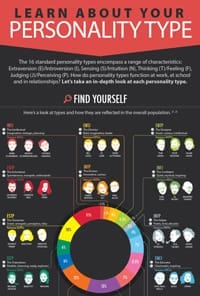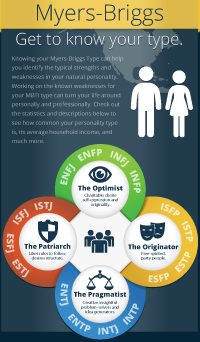Career Tips for ENTJ Personality Types (Extraverted-Intuition-Thinking-Judging).
Careers are complex, and the MBTI® can help narrow the scope of career searching by answering questions such as: What values, motivators, and life enjoyments are important? What type of workplace environment and kinds of people are best suited to matching an ENTJ personality? The Myers-Briggs Type Indicator® is based on Carl Jung’s theory of psychological types and defines 16 personality types based on how introverted or extraverted a person is, whether they tend to think analytically or emotionally, and many other variables. Isabel Myers and Katharine Briggs used Carl Jung’s psychological theories to develop the MBTI® Assessment. The Myers-Briggs® Test does not attempt to describe every characteristic of a person, it can however, provide a useful overview of personality aspects that can help find the right starting point for a new career. For example, being a legal or medical professional requires a highly analytical mindset, the ability to process large amounts of information quickly, and strong social and communication skills. These skills come naturally to ENTJs and so a person with this personality dichotomy may be particularly fulfilled in these and similar careers. During the career exploration process, choosing a career, setting goals, gathering information, networking, and decision making will be approached differently, dependent on ones MBTI® type.
ENTJ Personality Types (Extraverted-Intuition-Thinking-Judging) and Career Choice.

Read about The Myers-Briggs® Test ENTJ Personality Types Career Tips and other Occupational Information.
ENTJs are frank and decisive individuals who thrive when given the opportunity to solve organizational problems. They are natural leaders who enjoy planning and goal-setting, and they are also vocal and assertive when presenting their ideas. An ENTJ is unlikely to stay quiet in a board meeting or leadership conference. Instead, they are charismatic, hard-working, and willing to do whatever it takes to keep their organization operating smoothly, successfully, and profitably. ENTJ personality types are also inherently curious, innovative people. They are motivated by pushing their own and others’ horizons and abilities. For example, while other individuals may be discouraged when faced with a seemingly insurmountable problem or a large amount of data to be analyzed, ENTJs are motivated by these challenges – they truly enjoy developing creative solutions to difficult problems or researching their questions until they have the information they need to do so. They enjoy their association with friends, coworkers, and supervisors who are similarly minded, and who are highly intelligent and knowledgeable about their own areas of expertise, even if they do not overlap with their own. For example, an ENTJ city planner may build close friendships with colleagues who specialize in architecture or engineering, or who work in other branches of government, and they are likely to enjoy working with and learning from them.
Most of the time others perceive ENTJ personality types as driven, enthusiastic, and dedicated. However, at times, they may be seen as being too sharp. For example, an ENTJ may think they are being helpful when presenting their own opinion without being asked, but others may perceive this behavior as being presumptuous. An ENTJ may think they are presenting a passionate and well-articulated position, for instance in a board meeting, while others may perceive their behavior as being aggressive. These miscommunications could occur in client meetings, board meetings, or even at social events. As such, ENTJs may need to consider the contexts in which they will be expected to communicate as they decide on a career path. Vocations such as counseling, that require significant emotional human-to-human contact may not be best-suited for ENTJs. On the other hand, those that value objective achievements, such as research, business, or medicine may be a better fit. While it is natural for ENTJs to give less attention to their more sensitive, emotional personality traits, they may still want to take the time to develop them. Regardless of career choice, the ability to value and connect with other people can have immense benefits.
ENTJs may not be the ones to organize an office holiday party but being able to notice a coworker is having a hard day or being able to emotionally connect with a client or patient can make the difference between a great professional and an exceptional one. Because of their considerable leadership skills and motivation to achieve, ENTJs are often attracted to positions where they are decision-makers, executives and managers. Their ability to identify systemic problems, inconsistencies, and inefficiencies makes them quickly rise to the top of their organizations. Furthermore, because of their acute attention to detail, penchant for organization, and naturally analytical thought processes, ENTJs thrive in fields relating to the sciences, medicine, and law. ENTJs can be found holding top executive positions such as the Chief of Surgery at a hospital, Director at a University, Hospital, or Research Center, or Senior Partners at Law Firms. Other potential careers trending for this personality dichotomy are Aerospace Engineers, Architect, Architectural and Engineering Manager, Chef, Computer and Information Systems Managers , Electrical Engineer, Emergency Management Director, Epidemiologist, Market Research Analyst, and Pharmacists. In all of these cases, they hold a significant amount of influence over their organization, and they are also in a field where objectivity and a close attention to detail are rewarded.

Read about The Myers-Briggs® Test ENTJ Personality Types Career Tips and other Occupational Information.
ENTJ Personality Types Goal Setting and Gathering Information.
ENTJs are inherently able to set long-term detail-oriented goals and envision them with extraordinary clarity. They start to plan by working backwards—they might ask themselves “What do I need to do in order to achieve my goals?”. The aspiring physicist might apply to premier physics programs, work with professors whose research interests align with their own, secure grants to publish papers, travel to research conferences, and take other steps to ensure that they build a strong foundation to achieve their goals. The biggest challenge with developing such a detailed plan is that ENTJs have difficulty changing course or adapting to unforeseen circumstances. This challenge has the strength to even discompose individuals with this personality type. An ENTJ should incorporate objectives which have the specificity to enable options among possible offers and set aside time to conceptualize positions which had not been considered. As such, it could benefit them to take additional time gathering information and developing contingency plans. For example, an ENTJ considering law as a career might consult with successful lawyers, shadow a professional for a few days, enroll in pre-law coursework, or speak with professors or other professionals in order to gather as much information as possible. When speaking with these experts an ENTJ will immediately contact others who are eager for common interest of career exploration, and will collaborate to find prospects allowing for innovation and education. In doing so, they have a tendency to neglect relevant information about sought positions. In order to widen information sourcing, an ENTJ should consider visiting a career library during this step. In addition, documenting priorities and composing a “short list” of positions which hold most interest will be helpful tools for these individuals.
ENTJ Personality Types and Networking.
Most ENTJs are highly social and already have a substantial plexus of connections, so “networking” can sometimes become confused with socializing. Blocking out time each week for leisure socialization is important so they can focus networking time on developing leads that are beneficial to their goals. Once ENTJs have more complete information, they should record and organize their possible paths into a list. They might also start brainstorming pros and cons of various positions, especially if they are making a major life change. They also need to ensure they meet the job requirements, or decide if they are willing to develop additional skills or degrees that are required by the job of interest. While networking, ENTJ personality types can consider looking into related careers, such as becoming a paralegal, doing legal research, and so on. ENTJs are highly social, big-picture thinkers, so in interviews they may find it challenging to focus narrowly on how they can contribute to their prospective organization. As they prepare for interviews, ENTJs should practice giving succinct answers that explain how they will be able to make an immediate impact. For example, if they are asked how they would approach a client whose request does not align with industry best practices, ENJTs should organize their response using the transition phrases “first,” “next,” and “last” in order to explain their recommendation. As ENTJs practice interviewing, they should try not to overwhelm the interviewer with too many contingencies or possibilities. ENTJs often are also reluctant to pause, in order for an interviewer to ask questions, resulting in appearing loquacious. Enthusiasm and energy are second nature to individuals with this personality type, and during networking endeavors ENTJs will traject these assets as well as their ability and potential but should also remember to develop rapport with prospective employers.
ENTJ Personality Types and Decision-Making.
ENTJs should do a reasonable analysis and weigh the pros and cons of each job offer. They may need to consider salary and compensation packages, work-life balance, work environment, and location. This personality type will expedite the decision making process, and doing so may carelessly disregard personal values by exclusively focusing on logical facts. ENTJs should discuss the possibilities with their families or partners as well, especially if one career option involves relocating or significant life changes. ENTJs may have a tendency to fixate on relevance when making decisions and not consider these aspects prior to acceptance. For example, if an ENTJ is a California resident, they may be tempted to take a higher-paying position located in the Midwest, since they will be earning more with the cost-of-living adjustment. However, if living near the ocean is truly important to them, the position may not be the best fit, even if it seems like the logical option. At the end of the day, a career change is about happiness, and every personality type should be honest with themselves about what they need to be truly happy. For this reason, it may be a good idea for ENTJs to plan a period of rest and reflection after receiving each offer in order to talk thorough the options with important people in their lives. Sometimes, taking a step back can help ENTJ personality types make a decision that is best not only for them, but also for their family. Choosing a new career is a major life change and can be an extraordinary source of stress. As ENTJs go through this process, they should be aware that they can feel isolated or alone when they are under stress. They may feel unappreciated or under-appreciated and may have difficulty reaching out to those who care about them. To help them cope with these feelings, ENTJs should consider setting aside time with a loved one or trusted colleague at regular intervals to touch base. Such a visit might give them a much-needed opportunity to release stress and tap into their support system. For the entirety of the career exploration process, ENTJs should use their MBTI® as a guide. The insights it provides can help focus their career search and help alleviate stress, so a new occupation can begin with confidence.
-
MBTI® Career Report
Price: $62.50 Buy NowDIGITAL DELIVERY
- Receive an in-depth 10-page report on your occupational matches
- Explore your preferred work tasks, environments, and industry matches
- Assessment sent digitally within 2-3 business hours of purchase
-
MBTI® Career Report + Strong & MBTI Combined Career Report + Strong Profile
Price: $96.95 Buy NowDIGITAL DELIVERY
- Three of the top career-focused tests included
- Designed to uncover the best career fit for your true self
- Links to complete assessments are sent digitally via email within 2-3 business hours of purchase
- Results sent in PDF form via email within 6-8 business hours
Download Sample MBTI® Career Report
Download Sample Strong & MBTI® Combined Career Report Plus Strong Profile
Download Sample Strong Interest Inventory® Profile Report
-
Strong Interest Inventory® & Skills Confidence Profile + Strong Interpretive Report
Price: $72.95 Buy NowDIGITAL DELIVERY
- Better understand your strengths, interests, preferences, and areas of confidence
- Connect your innate traits to a successful and satisfying career
- Links to complete assessments are sent digitally via email within 2-3 business hours of purchase
- Results sent in PDF form via email within 6-8 business hours
Download sample Strong Interest Inventory® & Skills Confidence Profile + Strong Interpretive Report
-
iStartStrong™ Report
Price: $39.95 Buy NowDIGITAL DELIVERY
- Plan your future career based on your interests and passion
- Start on the right path to finding a career that you’ll enjoy for years to come
- Links to complete assessments are sent digitally via email within 2-3 business hours of purchase
- You will be able to self-download your report as a PDF document immediately following the completion of your assessment.
-
MBTI® Step II™ Profile
Price: $82.95 Buy NowDIGITAL DELIVERY
Further investigate the intricacies of your personality with this detailed report of your MBTI® type and its features.- Dive more deeply into the intricacies of your personality with this detailed report of your MBTI® type and its features
- Use these additional four pages to gain insight into maximizing your work life, relationships, home life, and study
- Links to complete assessments are sent digitally via email within 2-3 business hours of purchase
- Results sent in PDF form via email within 6-8 business hours
-
MBTI® Step II™ Interpretive Report
Price: $109.95 Buy NowDIGITAL DELIVERY
- Explore the inner workings of what makes up your MBTI® personality type
- 17-page detailed analysis indicating the complexity of your personality using five different facets
- Links to complete assessments are sent digitally via email within 2-3 business hours of purchase
- Results sent in PDF form via email within 6-8 business hours
Learn More About the MBTI ENTJ Personality Type
Explore additional information that delves deeper into the ENTJ Personality Type by examining various personality and career based subjects:
- How the MBTI ENTJ Type relates to Innovation
- How the MBTI ENTJ Type relates to Project Management
- How the MBTI ENTJ Type relates to Emotional Intelligence
- How the MBTI ENTJ Type relates to Leadership
- How the MBTI ENTJ relates to Communication
Click on a link below to read more about different MBTI Personality Types
| ISTJ | ISFJ | INFJ | INTJ | ESTP | ESFP | ENFP | ENTP |
| ISTP | ISFP | INFP | INTP | ESTJ | ESFJ | ENFJ | ENTJ |
References
Introduction to Type (Isabel Briggs Myers, 1998, CPP Inc.)
Introduction to Type and Careers (Allen L. Hammer, 2007, CPP Inc.)








